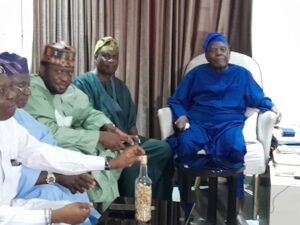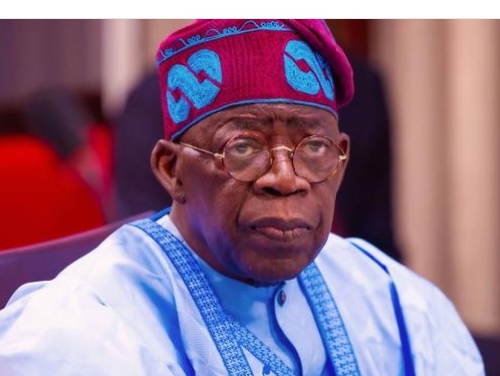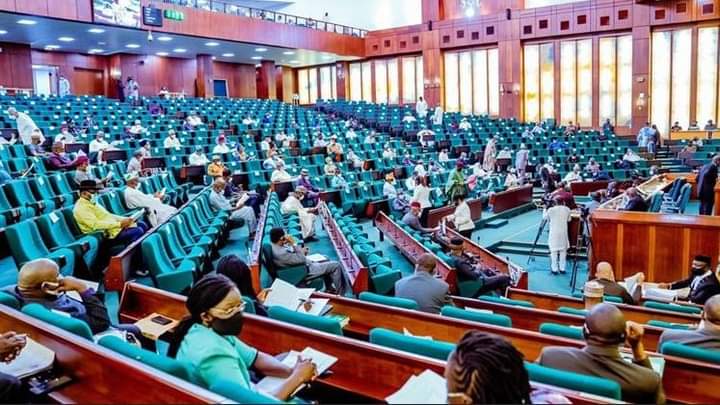It Will Stimulate Nigerians In All Walks Of Life, Says Akande Over Parliamentary System Bill

… it’s a Nigerian Bill-Caucus leader, Chinda
Frontline politician and former Governor of Osun State, and a chieftain of the ruling party, APC, Pa Bisi Akande has said the proposed shift to Parliamentary system of government by 60 members of the House of Representatives will stimulate Nigerians from all walks of life.
Speaking when the group led by the Minority Caucus Leader, Rep Kingsley Ogundu Chinda visited him in Abuja to table the proposal, Akande said:
“You are welcome, my leaders, the Nigerian leaders, Nigerian lawmakers and parliamentarians. I’m happy to welcome you.
“The most stimulating aspect of democracy is discussion. And what you have started now is to test the waters from the ideas of the Nigerian people.
“And now that you put it on the table, I know it will stimulate Nigerians of all walks of life to discuss, to review, to assess, and then advice. And at the end of it, I don’t see how your system will not be productive.
“I wish you the best in your endeavor, and I wish Nigerians the enjoyment of your good ideas. And in the end, I know you will come up with something that will do all of us good.
Earlier leader of the House of Representatives Minority caucus, Chinda chronicled what the Bill stands for noting that: “Our father, our leader, a de-tribalized Nigerian, a quintessential leader of the highest esteem, before you are your children, members of the House of Representatives, cutting across political party, tribe and religion. We have been elected to make laws for the good governance of our country,
“Sir, we sat down, looked at our country, where we’re coming from, where we are today, and we felt that country should develop based on her knowledge, environment, and circumstance.
“We have been besieged by several issues as a nation and we must state that we believe in this country, Nigeria, we believe in the indivisibility of our country, but we also believe that we must be dynamic, we must not shy away from change and so we felt that we need to introduce something new on the table.
“And having considered the pros and cons, advantages and disadvantages, we think it is necessary for us to start the process to rejig our system, to start the process to move from the present American typed presidential system to a Nigerian typed parliamentary system.
“Sir, we are not talking about a water type parliamentary system, not the textbook parliamentary system but we’re talking about one that will suit our country better for purposes of accountability, reduction of costs of governance, removal of that toga or aura that is built around public officers and our leaders who ordinarily are servants of the people.
“For us to understand government better and make decisions faster and easier for all of us in the interest of our nation, and so we have proposed three bills, sir.
“The bills have gone through the first reading to take us from the local government to the state up to the national, back to a parliamentary system of government and this process will be gradual.
“We do not expect that the change will come almost immediately. We must begin to test run the system and continue to make consequential amendments to all other laws so that we’ll all be in sync.
“We have come today to you, sir, considering your position in our country today, your wealth of experience, we know that we cannot succeed without tapping from the knowledge of those that have seen it all, and you are one of such persons in our country today.
“That is why we have come to you, to seek for your advice, to seek for your direction, to also tap from your inexhaustible wealth of knowledge in this sector, in public governance, both parliamentary and presidential system, and in fact the Nigerian system, which we know that you are very deep in understanding her workings.
“That’s why we have come, sir, to seek your support for this project, to also get advice from you, which will help us in moving this forward.
“But finally, I will say, sir, that at the end of the day, it is not our bill, it’s a Nigerian bill, so whatever Nigerians say will be the final result of this.
“But as legislators, we are dropping it on the table for Nigerians to deliberate and take a decision on it.







































